|
|
|
Sort Order |
|
|
|
Items / Page
|
|
|
|
|
|
|
| Srl | Item |
| 1 |
ID:
077963
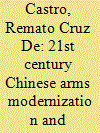

|
|
|
| 2 |
ID:
129841
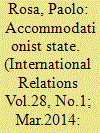

|
|
|
|
|
| Publication |
2014.
|
| Summary/Abstract |
This article aims to highlight the impact of strategic culture on Italian attitude to war and peace. The first section shows how both structural interpretations based on the influence of international variables and domestic models that neglect the cultural dimension offer no adequate explanations of Italy's military behaviour. The second section reviews the literature on strategic culture and its usefulness to explain the Italian case. The third section examines the characteristics of Italy's strategic culture through the period of the Republic, and the fourth examines the influence of ideational factors on its military behaviour abroad. In this section, a series of hypotheses derived from structural and cultural models are tested using data from the Correlates of War dataset. The conclusion provides a summary of the research findings that emerged from the empirical analysis.
|
|
|
|
|
|
|
|
|
|
|
|
|
|
|
|
| 3 |
ID:
080324
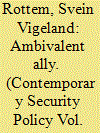

|
|
|
|
|
| Publication |
2007.
|
| Summary/Abstract |
NATO's future has long been in question, with the core of the debate revolving
around America and other great powers. This article finds comparable tensions
among smaller members. Examining the case of Norway, it argues that since the
end of the Cold War, Norway has lacked a clear mandate for its role in NATO,
and as such should be considered an ambivalent ally. This ambivalence is seen
when Norway reluctantly follows through on NATO policy. NATO's readiness to
act in the High North also is questioned.
This article examines Norway's NATO relations in four dimensions, collective
defence and collective security, position and values, influence and national priorities,
scepticism and reliability. Here realism and constructivism can provide us with an
analytical backdrop to explain Norwegian ambivalence. International power structures
create and constrain windows of opportunity for Norway, but national and international
norms and identity should not be left out of the analysis. Norway is entangled
in realist politics, but the legacy of neutrality and the perception of Norway as a
peaceful nation cannot be ignored. The result of this tension is Norway's unsettled
relationship with the new NATO.
|
|
|
|
|
|
|
|
|
|
|
|
|
|
|
|
| 4 |
ID:
073484
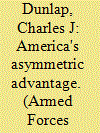

|
|
|
| 5 |
ID:
062827
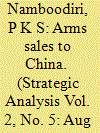

|
|
|
| 6 |
ID:
132864
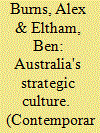

|
|
|
|
|
| Publication |
2014.
|
| Summary/Abstract |
This article draws on fourth generation strategic culture debates to show the gap between the rhetoric of Australian defence and the more modest reality. Our analysis shows that these limits derive from tensions between national strategic culture and organizational strategic subcultures. There are serious debates in the nation regarding the preferred course of the Australian military and security policy. This article frames these debates by examining the 'keepers' of Australia's national strategic culture, the existence of several competing strategic subcultures, and the importance of norm entrepreneurs in changing defence and national security thinking. Strategic subcultures foster compartmentalization, constraints, and bureaucratic silos that narrow national conceptions of security threats and opportunities, and impinge on the formation of coherent foreign and defence policy in relation to the Asia-Pacific region. This analysis shows that a distinct national strategic culture and organizational strategic subcultures endure beyond individual governments, placing potential limits on Australia's interface with other Asia-Pacific strategic cultures in the future.
|
|
|
|
|
|
|
|
|
|
|
|
|
|
|
|
| 7 |
ID:
120151


|
|
|
|
|
| Publication |
2013.
|
| Summary/Abstract |
Why and how can historical cases support different assessments of China rising with respect to the possibility of its becoming China threat? Rationalists and strategic culture analysts, who predominantly look at China from an external position, debate the influence of power, strategic cultures, and identities in explaining this highly controversial question. We, however, develop an internal view from the standpoint of a China looking out, which argues that different sources of Chinese self-role concepts could yield different policy behaviour. We analyse two discourses on Chinese foreign policy that have emerged in the 21st century-core national interest and harmonious world. We then introduce the dialectic approach of harmonious realism wherein indecisiveness is the essential characteristic. It is failure to decide on the specific purpose of Chinese foreign policy that creates China's self-role conflict. Harmonious disciplining, balance, racism, and intervention are the practical forms of China's harmonious realism through which the contemporary case analysis explains the forms, actual policy, and behavioural consequences of China's self-role conflict.
|
|
|
|
|
|
|
|
|
|
|
|
|
|
|
|
| 8 |
ID:
081274
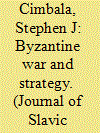

|
|
|
|
|
| Publication |
2008.
|
| Summary/Abstract |
The experience of Byzantium at war is not merely an intellectual exercise for historians but a vital source of insights pertinent to today and tomorrow's wars. The first part of this article offers a brief overview of the topic and the second part draws pertinent "lessons learned" applicable for modern strategy and policymaking. The argument will emphasize the Byzantine experience in the eleventh century-a period of great variation in Byzantine tactical, strategic, and grand strategic (i.e., political) performance. However, relevant evidence is not limited to that time period.
|
|
|
|
|
|
|
|
|
|
|
|
|
|
|
|
| 9 |
ID:
182603
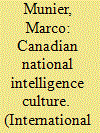

|
|
|
|
|
| Summary/Abstract |
This paper seeks to understand the nature and characteristics of Canadian national intelligence culture post–Cold War using the analytical insights of the strategic culture and intelligence culture literature. Previous studies have focused on an organizational description or historical studies of Canadian intelligence during the Cold War or after 9/11. Yet, no studies have examined the characterization of a national intelligence culture in Canada and proposed to contextualize the Canadian intelligence system in light of its national intelligence culture. Building on a culturalist approach of national intelligence systems, this paper proposes an operationalization of the national intelligence culture concept drawn on the strategic and intelligence culture literature. The paper concludes that Canada’s national intelligence culture is mostly defensive and minimalist. However, we note that recent changes in the Canadian intelligence apparatus have led to a gradual evolution of Canadian intelligence from defensive to offensive.
|
|
|
|
|
|
|
|
|
|
|
|
|
|
|
|
| 10 |
ID:
063072
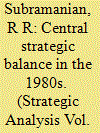

|
|
|
|
|
| Publication |
Aug-Sep 1980.
|
|
|
|
|
|
|
|
|
|
|
|
|
|
|
|
| 11 |
ID:
103589
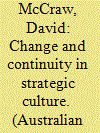

|
|
|
|
|
| Publication |
2011.
|
| Summary/Abstract |
The relationship between strategic culture and defence policies has not yet been much explored. Australia and New Zealand provide some evidence of the impact of strategic culture on defence policy. Australia has a dominant strategic culture which is strong enough to prompt both the major political parties to adopt realist defence policies, even though Labor has a traditionally 'idealist' outlook. Until the 1970s, New Zealand had a similar dominant strategic culture which influenced both major political parties, but it was always less strong than Australia's. In recent years, the Labour Party has rejected that culture, and allowed an alternative strategic culture based on its ideology to influence its defence policies. The result has been that on the last two occasions when Labour has been in government, New Zealand's defence policy has changed dramatically.
|
|
|
|
|
|
|
|
|
|
|
|
|
|
|
|
| 12 |
ID:
153210
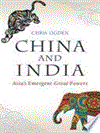

|
|
|
|
|
| Publication |
Cambridge, Polity Press, 2017.
|
| Description |
ix, 213p.: tablespbk
|
| Standard Number |
9780745689876
|
|
|
|
|
|
|
|
|
|
|
|
Copies: C:1/I:0,R:0,Q:0
Circulation
| Accession# | Call# | Current Location | Status | Policy | Location |
| 059106 | 327.51/OGD 059106 | Main | On Shelf | General | |
|
|
|
|
| 13 |
ID:
077019
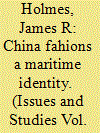

|
|
|
| 14 |
ID:
132868
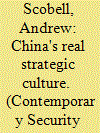

|
|
|
|
|
| Publication |
2014.
|
| Summary/Abstract |
The Great Wall is frequently held up as the most striking symbol of the potency of a persistent Chinese pacifist, non-expansionist, defence-minded strategic stance. But how accurate is this 'Great Wall' depiction of China's strategic culture? What is the impact of this depiction on China and the Asia-Pacific region? While the Great Wall is an apt symbol of a romanticized image of Chinese strategic culture, the reality behind the genesis of this impressive fortification and the accompanying pervasive belief in a monistic strategic tradition is that they are figments of the collective contemporary Chinese imagination. Nevertheless, these formidable myths exert real influence on two 'faces' of strategic culture. The first face refers to how leaders and society perceive the policies and actions of their own country. The second face, routinely neglected, refers to how leaders and society in one state perceive the policies and actions of an adversary or potential adversary state, which, like the first face, is constructed out of myth. The impact of these two faces on the Asia-Pacific region exacerbates the region's security dilemma, adversely impacting China's relations with other countries, notably Japan and the United States.
|
|
|
|
|
|
|
|
|
|
|
|
|
|
|
|
| 15 |
ID:
184349
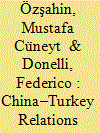

|
|
|
|
|
| Summary/Abstract |
There is plenty of studies focusing on China’s global outreach through its Belt and Road Initiative (BRI). In tandem with this, the extensive literature on China depicts it as the next hegemon to succeed in the USA. Along this line, flourishing ties with various Asian nations, including the Middle Eastern countries, as a result of China’s recent foreign policy activism has been addressed extensively. While most research has been stressing the rising assertiveness of China in world politics, only a limited number of studies have touched upon the responses from middle or small powers against China’s ascent. Drawing from neoclassical realism, this article contends two levels of analysis for delineating the interaction between Turkey, a middle power, and China, a rising great power. First, the exchange between Turkey and the USA is vital in determining the cordial relations between Turkey and China. Alteration in the American policy vis-à-vis Turkey in the wake of the Arab Spring is relevant to Turkey’s growing relations with China. Second, is the rising anti-Westernism of foreign policy elites as part of the alteration in the strategic culture of Turkish politics, which makes Turkey’s rapprochement with China possible. Nevertheless, it should be noted that these two levels are intertwined and feed each other. Consequently, employing a neoclassical realist approach, the article argues that the middle powers’ stance against a rising hegemon is conditional upon the bilateral relations with the current hegemon and peculiarities of domestic politics.
|
|
|
|
|
|
|
|
|
|
|
|
|
|
|
|
| 16 |
ID:
130426
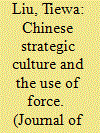

|
|
|
|
|
| Publication |
2014.
|
| Summary/Abstract |
This article reviews and explains Chinese attitudes towards the use of force in international affairs, especially from the perspective of strategic culture. The author traces back the traditional values which originated from ancient Chinese thoughts and also researches Mao Zedong's perception of war, which symbolizes the contemporary Chinese military strategic theory, and Deng Xiaoping and Hu Jintao's discourse on war thereafter, which represents the beliefs of the Chinese government after adopting the opening-up and reform policy. The case studies of the Korean War, the Vietnam War and the two Iraq Wars further explore the principles which dominate the diplomatic decision-making processes. The article concludes that China, in the predictable future, will still firmly adhere to the principles of state sovereignty, non-interference and non-use of force principles, while at the same time China will not hesitate to participate in the multilateral operations which are ratified with UN Security Council authorization and contribute increasingly to improving humanitarian situations due to its moral and political understanding of the use of force in international relations
|
|
|
|
|
|
|
|
|
|
|
|
|
|
|
|
| 17 |
ID:
066017
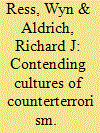

|
|
|
| 18 |
ID:
054612
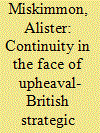

|
|
|
| 19 |
ID:
107576
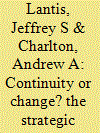

|
|
|
|
|
| Publication |
2011.
|
| Summary/Abstract |
Important puzzles remain in security policy literature, including whether strategic culture can change over time, and if so, under what conditions. This study proposes a model of strategic cultural change that identifies key actors and conditions at work in the process. The article then applies the model to chart the evolution of Australian security policy in the past two decades. We find that structural changes, including geostrategic situation and new security threats, coupled with elite interpretation and discourse, have produced a new "regional defense plus" strategic cultural frame for Australia. This, in turn, has led to measureable changes in defense policy. This work concludes with insights on the implications of change for the broader literature on strategic culture and constructivist security studies.
|
|
|
|
|
|
|
|
|
|
|
|
|
|
|
|
| 20 |
ID:
067215
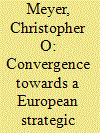

|
|
|
|
|
|
|
|